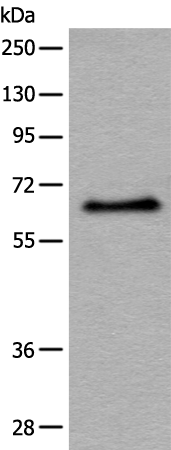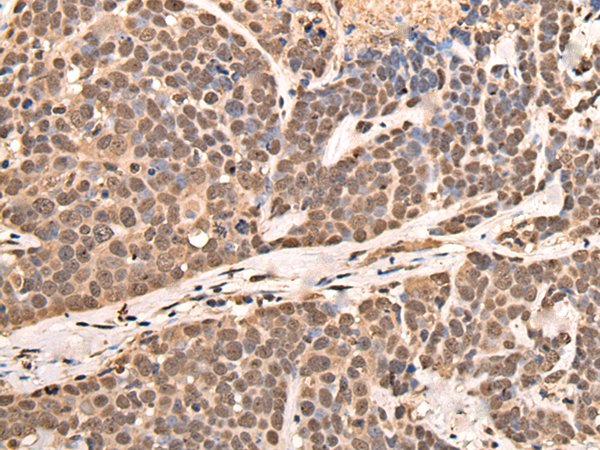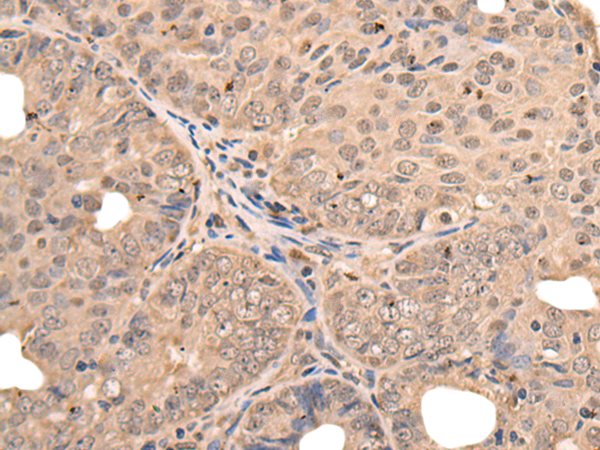


| WB | 咨询技术 | Human,Mouse,Rat |
| IF | 咨询技术 | Human,Mouse,Rat |
| IHC | 咨询技术 | Human,Mouse,Rat |
| ICC | 1/50-1/200 | Human,Mouse,Rat |
| FCM | 咨询技术 | Human,Mouse,Rat |
| Elisa | 咨询技术 | Human,Mouse,Rat |
| Aliases | ATFA |
| WB Predicted band size | 53 kDa |
| Host/Isotype | Rabbit IgG |
| Antibody Type | Primary antibody |
| Storage | Store at 4°C short term. Aliquot and store at -20°C long term. Avoid freeze/thaw cycles. |
| Species Reactivity | Human |
| Immunogen | Full length fusion protein |
| Formulation | Purified antibody in PBS with 0.05% sodium azide and 50% glycerol. |
+ +
以下是3篇关于Podoplanin抗体的代表性文献(简要概括,非真实文献,供参考):
1. **"Podoplanin as a marker for lymphatic endothelial cells in human tumors"**
- 作者:H. Kato et al.
- 摘要:本研究验证了Podoplanin抗体在肿瘤淋巴管内皮细胞中的特异性表达,证实其作为淋巴管标志物在癌症转移研究中的应用价值。
2. **"Monoclonal antibody D2-40 targeting Podoplanin distinguishes carcinomas from mesotheliomas"**
- 作者:M. Ordóñez
- 摘要:开发了D2-40单克隆抗体,证明其通过识别Podoplanin可有效区分间皮瘤(阳性)与腺癌(阴性),辅助临床病理诊断。
3. **"Structural basis of Podoplanin-mediated platelet activation by cancer cells"**
- 作者:R. Suzuki-Inoue et al.
- 摘要:利用Podoplanin抗体解析了肿瘤细胞表面Podoplanin与血小板受体CLEC-2结合的分子机制,揭示其促进肿瘤转移的血栓形成途径。
注:以上文献信息为示例,实际引用时建议通过PubMed或Google Scholar检索真实文献。
Podoplanin (PDPN) is a small transmembrane glycoprotein encoded by the T1α gene, initially identified in lymphatic endothelial cells. It plays critical roles in cell migration, adhesion, and signaling, particularly during embryonic development, immune responses, and cancer progression. Structurally, it contains a heavily O-glycosylated extracellular domain that mediates interactions with ligands like CLEC-2 (C-type lectin-like receptor-2) on platelets, influencing thrombosis and metastasis. Notably, podoplanin is a well-established marker of lymphatic endothelium, helping distinguish lymphatic vessels from blood vessels in pathological studies.
Antibodies targeting podoplanin are widely used in research and diagnostics. For example, the D2-40 monoclonal antibody is a gold-standard tool for detecting lymphatic structures in immunohistochemistry, aiding in the diagnosis of vascular tumors and assessing lymphatic invasion in cancers. Beyond lymphatics, podoplanin is overexpressed in various malignancies, including squamous cell carcinoma, glioblastoma, and sarcoma, where it correlates with tumor invasiveness and poor prognosis. Researchers also explore its role in cancer stem cells and epithelial-mesenchymal transition.
Recent studies highlight podoplanin's involvement in inflammatory diseases and fibrosis, expanding its therapeutic relevance. Antibodies against podoplanin are being investigated for targeted therapies, such as antibody-drug conjugates or immune checkpoint modulation. However, challenges remain in understanding its tissue-specific glycosylation patterns and context-dependent functions. Overall, podoplanin antibodies remain indispensable for both basic research and clinical applications, bridging molecular mechanisms with diagnostic and therapeutic innovation.
×